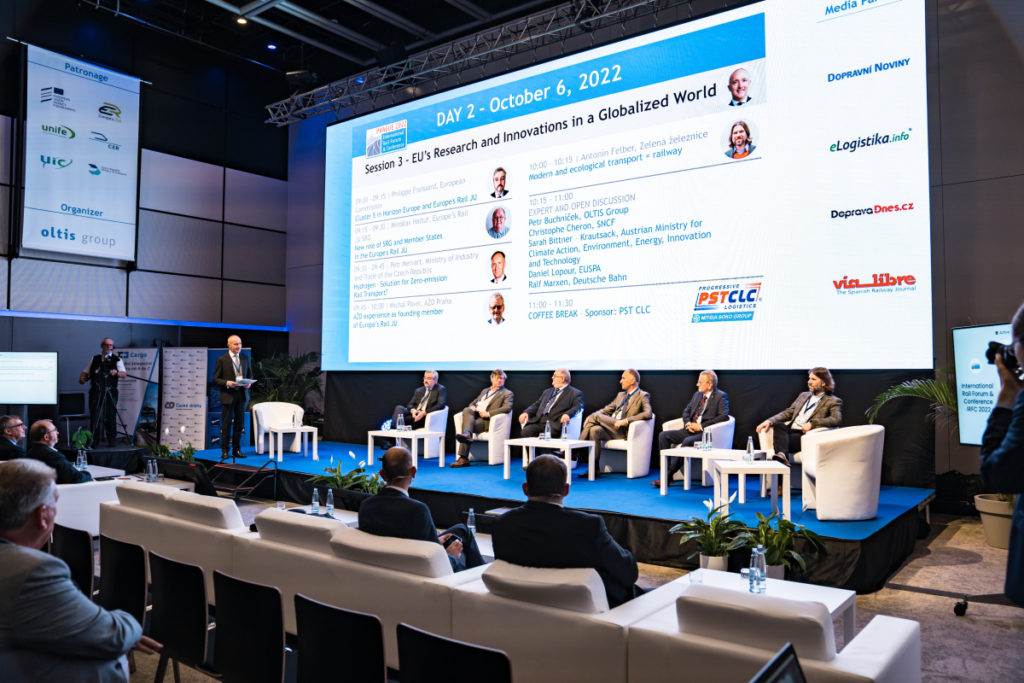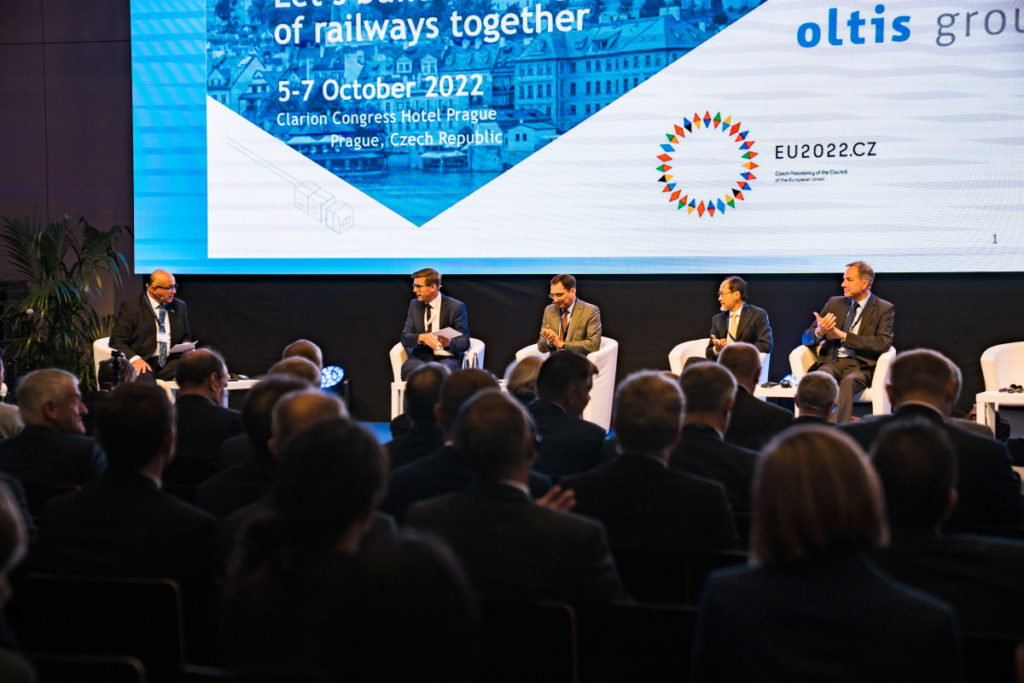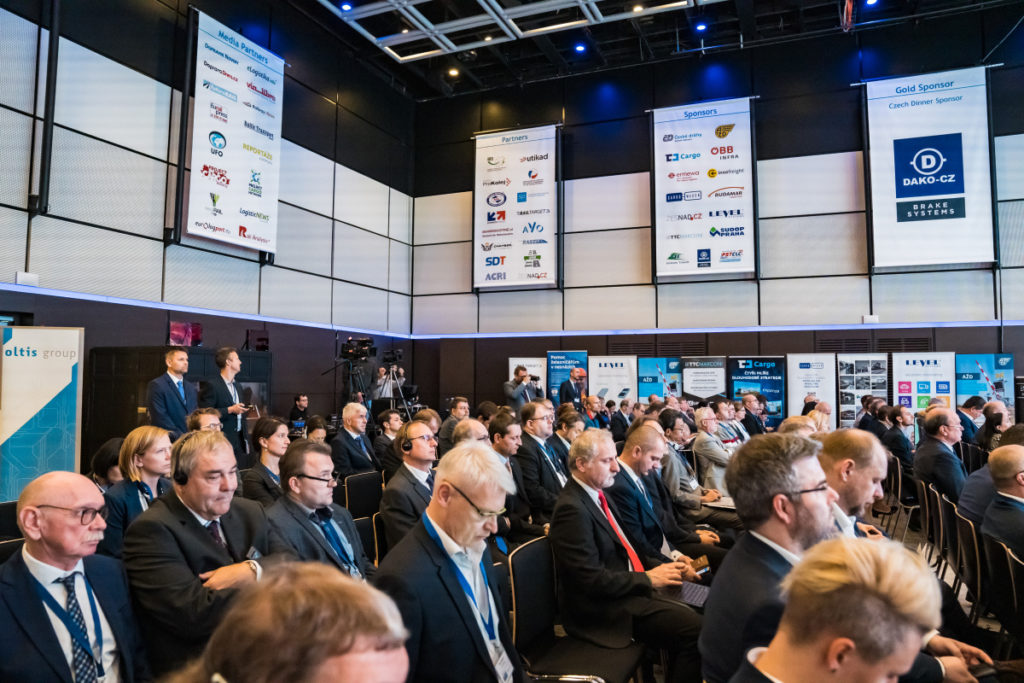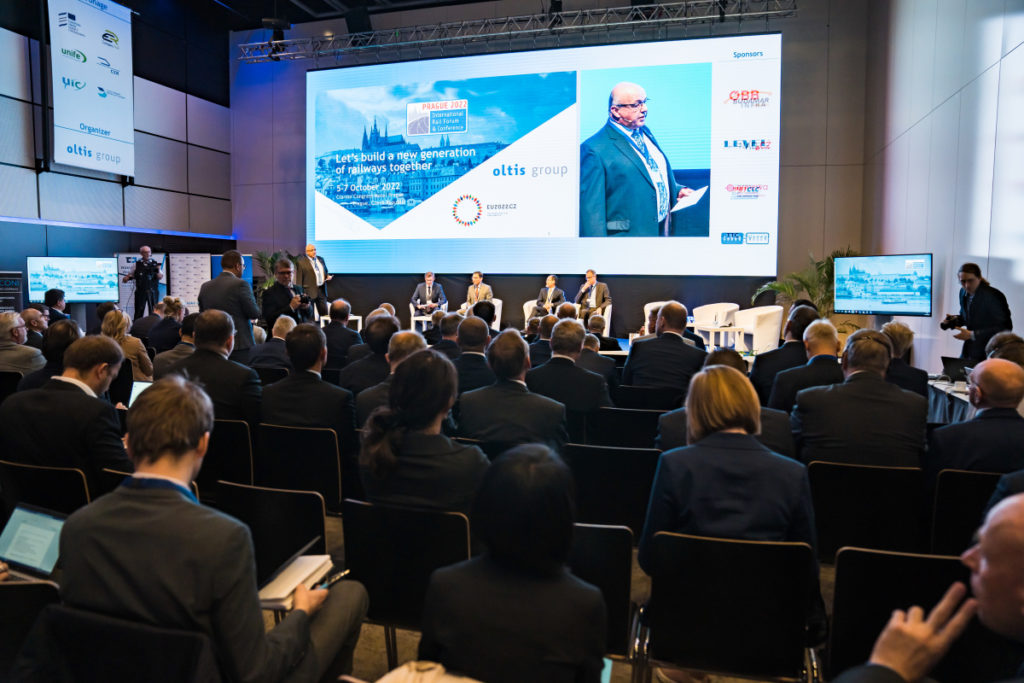The seventh International Railway Forum & Conference took place from 5th to 7th October, 2022, in the Clarion Congress Hotel Prague, this time with the patronage from the Minister for European Affairs, Mikuláš Bek, PhD, granted within the frame of the Czech Presidency of the Council of the Eu-ropean Union in 2022. Other patrons of IRFC 2022 included major European organisations: ERA (Eu-ropean Union Agency for Railways), UNIFE (European Rail Supply Industry Association), CER (Commu-nity of European Railway and Infrastructure Companies), UIC (International Union of Railways), Eu-rope’s Rail JU, and the Ministry of Transport of the Czech Republic. The conference also secured 16 partners, especially from national and international organisations in the railway industry, transport, and logistics. This successful event with a Europe-wide reach is traditionally organised by OLTIS Group.
This year of the conference had 217 participants from 18 countries, including 55 speakers and moderators and representatives of the most important railway companies and organisations. The conference was accompanied by the usual expert exhibition with 16 exhibitors, including railway undertakings, rail industry, IT companies, international organisations and media. The great thanks belong also to 15 major sponsors. Gala dinner on the first day and a themed dinner (“Czech dinner” this year) on the eve of the second day are part and parcel of IRFC 2022.

Opening speech of Mr. Martin Kupka, Minister of Transport of the Czech Republic, highlighted the priorities of rail transport which are driving the Czech presidency. Railway transport forms the backbone of the national transport system to become an environmentally friendly and safe mode of transport. Following the European Green Deal, rail must significantly reduce emissions in the transport sector and environmentally friendly transport modes need to be promoted in relation to that. We need a network that is robust in terms of capacity, secured and energy efficient, with as few bottlenecks as possible. Increasing the capacity of the rail infrastructure, focus on the construction of high-speed lines and finalising the revision of the TEN-T regulation are the main challenges for Czech rail sector to ensure sustainable connectivity throughout the European Union with proposed extension of EU transport corridors to the territories of Ukraine and Moldova. Other speakers in the first session, from the European Commission and sectoral organisations, also mentioned the need for digitalisation and automation, preparing the rail sector for continuation in negotiating several important legislative proposals of the Fit for 55 Package, which will contribute to decarbonization of transport.

The moderator of the second session, ERA Executive Director Josef Doppelbauer, summarised the presentations of all speakers and panellists on the need for standardisation and interoperability into a concise statement that without standardization, interoperability and implementation of ERTMS with the contribution of digital automatic coupling, it is impossible to create a resilient, capable and above all safe European railway. It will not be an easy road. It will be long and full of compromises, but the sooner we start on it, the sooner we can benefit from the results of further research projects.
The second day of the conference picked up right where the first day left off. Research and innovation under the umbrella of the Europe’s Rail JU partnership, cooperation between Member States and the exploitation of synergies are essential for the further development of the rail sector. This was the main summary message of the moderator of the third session, Carlo Borghini, Executive Director of the Rail Partnership. He also recalled that the railway is not an isolated element in the transport system, that it must be involved in intelligent transport systems, and that it must take advantage of the opportunities for cooperation with EUSPA and other institutions in order not to fall behind technologically.

The fourth and fifth sections were very closely related to each other. The section on high-speed transport was moderated by Ondřej Kovařík MEP and the fifth section on TEN-T by Mr Wim van de Camp, Special Adviser to the Commissioner for Transport. It was stated that connecting the most important business centres and capitals of all EU countries as soon as possible by a high-speed rail network is not just an ambitious plan, but a necessity. It will not only reduce the carbon footprint, increase the capacity of the conventional rail network, but also enable better and more efficient assistance to any Member State or candidate country in the event of any crisis. The example of assistance to the Ukrainian Railways, whose representatives have clearly and precisely defined their needs, makes this abundantly clear. The speakers in both sessions also made it clear that great attention should be paid to physical and cyber security and that critical transport infrastructure in the EU should also be built on the principle of dual use for military and civilian mobility.

The last day of the conference was dedicated to a technical visit to the most modern regional railway in the Czech Republic – the Plum Railway line. During this visit participants could learn about cutting edge trends in signalling technology in rail transport, track monitoring using drones or development of an autonomous train. From the feedback of the visitors it was clear that AŽD Praha, the owner and operator of this railway, is doing its job at the highest possible standard.
Overall, the conference met all its objectives and became a truly open forum for discussion across a very broad spectrum of the railway system.






